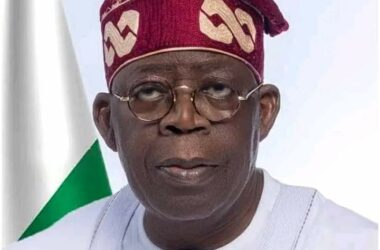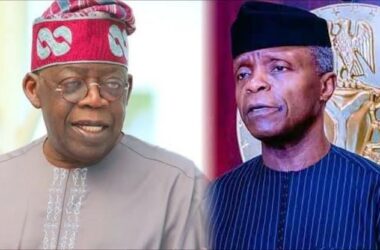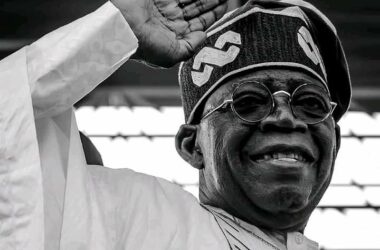Until her suspension, Nigeria’s Minister for Humanitarian Affairs and Poverty Alleviation, Dr. Betta Edu was – at 37 – the youngest member of President Bola Ahmed Tinubu’s Federal Executive Council. A former women’s leader of the ruling All Progressives’ Congress (APC) and a former Commissioner for Health in her native Cross River State, Edu was seen in many influential quarters as a rising star in the country’s political firmament. Her appointment was President Tinubu’s answer to those who have always clamoured for government to be more inclusive in terms of having more young people at the top table, and to have a robust female component. As both young and female, the suspended Minister was an avatar for many of her gender and generational age bracket – whether or not that was her intention.
But now, with her recent travails over a highly suspicious cash transfer (of public money into a private bank account) the rising star risks ending up as shooting star – a planetary body which lights up the night sky for a brief, spectacular moment before fizzling into oblivion.
Edu was reported to have directed the Accountant-General of the Federation, Dr. Oluwatoyin Madein, to transfer N585 million to a private account owned by one Bridget Oniyelu, whom her Ministry identified as the Project Accountant in charge at the Grants for Vulnerable Groups scheme, a social investment initiative of the Federal Government. The Minister’s instructions for the payment were contained in a leaked memo dated December 20, 2023. The Federal Ministry of Humanitarian Affairs and Poverty Alleviation disclosed during the first week of January 2024 that the N585.18 million grant for vulnerable groups in four states was approved and followed the stipulated due process of government. The states are Akwa Ibom, Cross River, Lagos and Ogun.
The Minister has dismissed the notion that her action amounted to fraud – claiming instead that it was legal within the civil service for such payments to be made into private accounts of staff members, especially project accountants, and that the furore was simply a mere fabrication by her detractors who are seeking to frustrate her efforts in fighting corruption in her Ministry and its agencies, as well as the Ministry’s mandate, that is, to uplift the needy.
But her critics, including a prominent Nigerian legal expert, said that the act of approving the payment of over half a billion naira to a private account in contravention of the extant Public Service Rules as well as the Independent Corrupt Practices and Other Offences (ICPC) Act and the Penal Code applicable in the Federal Capital Territory was illegal, and a betrayal of the confidence reposed in her. “There can be no legal justification,” said the renowned legal expert, Femi Falana, SAN, in his reaction on the matter, “for the criminal diversion of the said sum … since the Ministry of Humanitarian Affairs and Poverty Alleviation has (already) collated the individual bank accounts of all the vulnerable people.”
Having regard to the facts and circumstances of the matter, Falana and others commended the Economic and Financial Crimes Commission (EFFC) for the recovery of the sum of N37 billion meant for vulnerable people in Nigeria, and called on the EFCC to speed up the ongoing investigation of the Ministry of Humanitarian Affairs. Legal experts say the transfer contravenes various sections of Nigeria’s Financial Regulations 2009 meant to prevent fraud and other forms of corruption in government business. In particular, Chapter 7, Section 713 of the document emphasises the separation of public and personal money in government transactions states. “Personal money,” it states, “shall in no circumstances be paid into a government bank account, nor shall any public money be paid into a private account.” It also says that any officer who pays public money into a private account is deemed to have done so with fraudulent intentions.
Also, to counter the Minister’s assertion that the transaction was above-board and well within the rules and regulations of the federal civil service, Dr. Madein, the Accountant-General admitted that though her office received Dr. Edu’s request for the transfer of the N585.2 million to Oniyelu’s private account, she had refused to honour it. “The Ministry was advised on the appropriate steps to take in making such payments in line with the established payment procedure,” she said. “No bulk payment is supposed to be made to an individual’s account in the name of the Project Accountant.” Payments to the tune of N585.2 million, Madein said, were usually processed by the affected ministries as self-accounting entities, adding that such payments should be sent to the beneficiaries through their verified bank accounts.
The Edu affair is not the first time the country’s social investment landscape is being enmeshed in a financial scandal of this magnitude. As a matter of fact, the immediate past Minister of Humanitarian Affairs and Poverty Alleviation, Hajiya Sadiya Umar-Farouk, is currently being investigated by the EFCC for alleged fraud. There is also an ongoing EFCC investigation into another official, Halima Shehu, who was suspended as the national coordinator of the National Social Investment Programme Agency (NSIPA), an agency of that Ministry, over an alleged N37.1 billion fraud. Mrs. Shehu was said to have claimed in December 2023 that over 1.5 million households in the country had each received the sum of N20,000 from the Conditional Cash Transfer programme of the federal government – though there seemed to be no proof of such payments.
In suspending Dr. Betta Edu, the President (according to his media aide, Ajuri Ngelale) acted in line with his avowed commitment to uphold the highest standards of integrity, transparency and accountability in the management of Nigeria’s commonwealth. Not only that, the President has also directed a comprehensive inquiry into the Edu affair, vowing to “decisively punish” those involved in any breaches and infractions unravelled during the investigations. Several stakeholders, including opposition parties and civil society groups have added their voices in calling for a thorough investigation into the matter.
President Tinubu’s action is significant on a number of levels – given the picture Nigeria has consistently painted for both her citizens and for outsiders as far as transparency and accountability among public officials are concerned. As a number of foreign outlets were quick to point out in their reporting of the axing of Dr. Edu, the suspension of a Minister – for any reason whatsoever – is a rare occurrence in Nigeria. Even rarer are voluntary resignations by high officials. Reason being that in Nigeria, public office is a gravy train, which upon one’s entry, one acquires a lifetime ticket to stupedous wealth that can last for generations. Public office, and the powers and perks that come with it, means that oftentimes the holder sees himself or herself as being above the law, as being far removed from the demands of transparency and accountability, and as being beyond the threat of consequences and sanctions for bad behaviour. For too long, the system has fostered a culture of impunity that has permeated every aspect of our body politic and our very psyche. For one, therefore, the President’s actions (not just in terms of Edu but others in her position as well) speaks to his readiness to ensure that every member of his cabinet is on the same page as far as the shrewd management of public resources is concerned. Recall that shortly after his election, he had made the ‘drawing water from a dry well’ analogy to emphasize the absolute need for strict adherence to due process and laid down procedure in the conduct business, including the handling of scarce public finances.
The immediacy of Tinubu’s order, albeit on the back of public outcry, also speaks of a decisiveness that was not lost on observers – especially as it comes after the tenure of former President Muhammadu Buhari, who managed to sack only two of his highest-ranking officials during his entire eight-year tenure. Most of the time, he would rather defend them by highlighting, not their stewardship in office, but their loyalty.
In asking the Economic and Financial Crimes Commission (EFCC) to embark on a thorough investigation into all aspects of the financial transactions involving the Federal Ministry of Humanitarian Affairs and Poverty Alleviation, as well as calling for the reform of institutions that run national social investment programmmes like the Grant for Vulnerable Groups that aim to tackle poverty, Tinubu has signaled to his Ministers and all officials of the federal government that their actions would henceforth be under greater scrutiny than ever before, as his government tries to win back lost public confidence among Nigeria at a time when such confidence among ordinary Nigerians is at an all-time low.
This is not the first time the federal government’s National Social Investments Programme (NSIP) has been questioned in terms of its efficacy and timeliness in delivering its mandate, vis-a-viz the huge funds that have so far been expended on it. Back in the days of former President Buhari, the President’s wife, of all people, was particularly vocal in expressing her dissatisfaction with the performance of the NSIP. But as in most things Nigerian, where opacity (rather than transparency) is the name of the game, the operations of the NSIP are not fully understood, even by the people the agency is supposed to benefit. Perhaps this is what led President Tinubu to task a panel headed by the Coordinating Minister of the Economy and Minister of Finance, Mr. Wale Edun, to, among other functions, conduct a comprehensive diagnostic on the financial architecture and framework of the NSIP with a view to ‘conclusively reform the relevant institutions and programmes in a determined bid to eliminate all institutional frailties for the exclusive benefit of disadvantaged households.”
The President’s action has drawn praise from a wide cross-section of Nigerian society, with many of his compatriots also expressing the hope that this move would be continued and sustained throughout his tenure in office – or at least until it gains more traction in the system, and in the consciousness of the vast majority of Nigerians.






